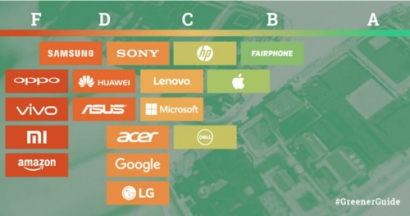
The scores are based on a company’s transparency, performance and advocacy efforts in three areas Greenpeace believes are critical to putting the sector on a sustainable path: reduction of emissions through renewable energy, use of recycled materials, and elimination of hazardous chemicals.
"Tech companies claim to be at the forefront of innovation, but their supply chains are stuck in the Industrial Age. We know they can change. Rather than fuelling climate change, these companies need to show the way forward, just as some companies like Google and Apple have with data centers run on renewables," said Gary Cook, Senior IT Campaigner at Greenpeace USA.
Dell and HP follow Apple and Fairphone with a C+, while eleven companies, including Samsung, Huawei and Amazon, fall in the D and F range.
Amazon’s only high score came in the area of renewable energy advocacy. Greenpeace reports, “Amazon was one of several IT companies who publicly urged President Trump to keep the US in the Paris Climate Agreement, and Amazon also joined Google, Microsoft, and Apple in filing an amicus brief in support of federal legislation that would limit carbon emissions from the US power sector.”
Apple’s only low scores came in the area of sustainable design and resource reduction. Greenpeace cites Apple’s failure to design products which can easily be repaired or upgraded as part of the reason. Also mentioned was Apple’s opposition to “Right to Repair” legislation in several US states.
Despite its central position as both the largest manufacturer of smartphones and one of the largest suppliers of displays, Samsung manufacturing system heavily relies on fossil fuels. The company used more than 16,000 GWh of energy in 2016, with just 1% coming from renewable earning them only a D-.
From 2006 to 2012, Greenpeace published the Guide with regularity, and as a result saw steady progress from companies to phase-out hazardous materials and make their devices more energy efficient.
“It’s clear the impacts of the linear take-make-waste business model of device manufacturers extend beyond the concerns of e-waste. We need to see greater ambition, more transparency, and follow through from companies to address the environmental impacts of their enormous supply chains. The current model cannot be maintained,” said Cook.
Greenpeace is challenging the IT sector to take responsibility for its rapidly increasing footprint on the planet by:
Illustration: Greenpeace USA

